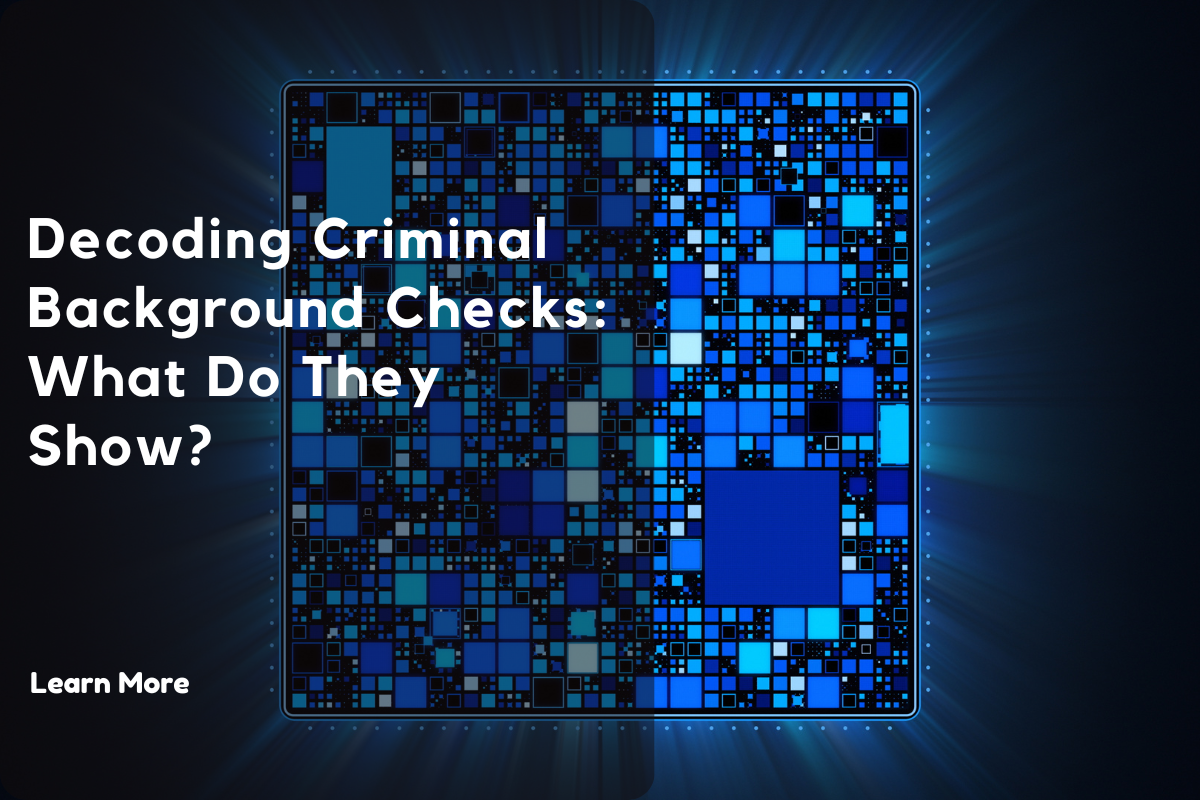 Introduction to Criminal Background Checks
Introduction to Criminal Background Checks
A criminal background check is a process used to review an individual’s criminal history to determine their eligibility for specific positions, housing, or legal purposes. Employers, landlords, licensing agencies, and even government bodies often require this information to assess the risk involved in allowing someone access to sensitive positions or responsibilities. Criminal background checks help verify the individual’s criminal record, including any arrests, charges, convictions, and incarcerations.
What is a Criminal Background Check?
A criminal background check is a screening process that searches databases, court records, police reports, and other government systems for any history of criminal behavior. It can uncover information on arrests, charges, and convictions. The goal is to provide an in-depth look into an individual’s past criminal activity, offering insight into any offenses that might disqualify them for a job, housing, or license.
Criminal background checks are widely used in:
- Employment: Employers use them to assess candidates’ fitness for certain roles, especially positions requiring trust, security, or direct interaction with vulnerable individuals.
- Housing: Landlords may use criminal background checks to decide whether to approve rental applications, ensuring that the tenant does not pose a risk to other residents or the property.
- Licensing: Certain industries and professions require a criminal background check to verify if a person meets the qualifications and complies with legal standards.
Types of Criminal Background Checks
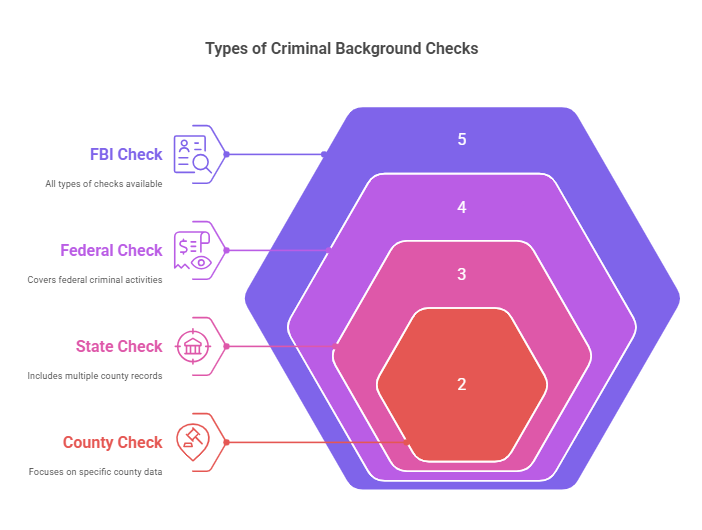
There are several types of criminal background checks conducted based on the level of jurisdiction and the type of information needed. The most common types include:
- County Criminal Background Checks: These checks focus on a specific county’s court and law enforcement records. They provide the most localized information, ideal for checking an individual’s criminal activity within a specific area.
- State Criminal Background Checks: A state-level check compiles data from various counties within the state, providing a broader view of an individual’s criminal history across the state.
- Federal Criminal Background Checks: These checks search records from the Federal Bureau of Investigation (FBI) or other federal law enforcement agencies. They cover federal offenses, such as tax evasion, immigration violations, or drug trafficking, that may not be included in state or county checks.
- FBI Criminal Background Checks: This is the most comprehensive type of criminal background check, performed by the FBI. It includes detailed records from across all jurisdictions, including federal, state, and county levels.
- FBI Identity History Summary Check: This specific check looks into an individual’s fingerprint records to identify any criminal activity recorded by the FBI.
What Information Does a Criminal Background Check Include?
A criminal background check can reveal a variety of information depending on the type of check being conducted. However, the most common elements typically found in a report are:
- Arrests: The report will include any arrests made, even if the individual was not convicted. This includes the date and nature of the arrest and the charges involved.
- Convictions: A conviction occurs when a person is formally found guilty of a crime in a court of law. This is often a key factor in employment or housing decisions, particularly for crimes that are deemed serious or related to the job.
- Pending Charges: If an individual has charges that are still pending (e.g., they have been arrested but the case is still in the legal process), this information will appear in the report.
- Court Records: These records provide details of any court proceedings, including the outcomes of criminal cases, sentences, and judgments. Court records may also show fines, probation, or other legal decisions.
- Incarceration: Details about whether the individual served jail time for any offenses will be included in a criminal background check.
- Sex Offender Registry: Many checks include a search of the National Sex Offender Registry, which lists individuals convicted of sex crimes.
Table: Breakdown of Different Types of Criminal Background Checks
| Type of Check | What It Includes | Jurisdiction Level |
|---|---|---|
| County Criminal Background Check | Local court records, arrest records, convictions | County level |
| State Criminal Background Check | Statewide arrest records, court records, convictions | State level |
| Federal Criminal Background Check | Federal offense records, including drug trafficking, immigration violations, etc. | National (Federal) |
| FBI Criminal Background Check | Comprehensive national records including federal, state, and county data | National (Federal) |
| FBI Identity History Summary | Fingerprint-based criminal history check from FBI | National (Federal) |
How Are Criminal Background Checks Used?
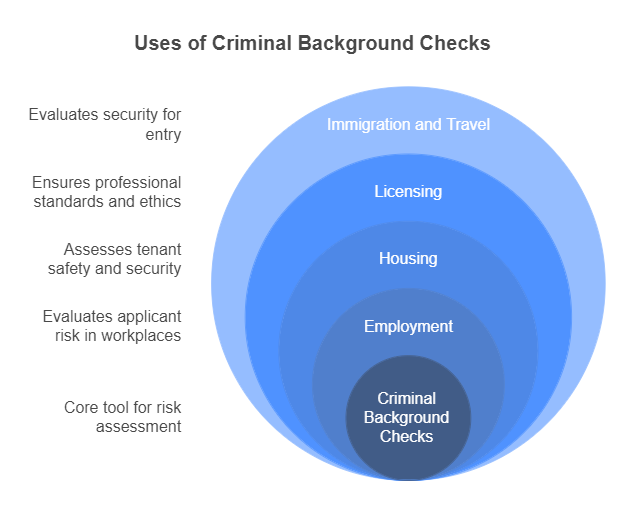
Criminal background checks are used in several industries to help organizations make more informed decisions. They play a critical role in:
- Employment: Many employers, especially those in security, healthcare, and finance, require criminal background checks for applicants. It helps determine whether the applicant poses a risk to the company, its clients, or its assets.
- Housing: Landlords and property managers use criminal background checks to evaluate whether potential tenants may pose a risk to the safety or security of the property and other residents. These checks help reduce the risk of renting to individuals with a history of violent or disruptive behavior.
- Licensing: Certain professions, especially those related to law, healthcare, or finance, require criminal background checks to ensure that individuals meet legal and ethical standards. Many regulatory bodies require background checks before issuing licenses to professionals such as lawyers, real estate agents, and healthcare providers.
- Immigration and Travel: Criminal background checks may also be used for immigration purposes or to evaluate security risks for those applying for visas or entry into certain countries.
Importance of Criminal Background Checks
Criminal background checks help mitigate risks in many industries by ensuring that individuals do not pose a safety, financial, or legal risk. For example:
- In employment, they help employers protect their employees, customers, and reputation by ensuring they hire trustworthy and reliable staff.
- In housing, these checks help property owners maintain a safe living environment by preventing tenants with dangerous histories from being approved.
- For licensing, they ensure that only individuals who meet the legal standards and qualifications are allowed to work in certain professions.
By using criminal background checks, businesses, landlords, and licensing agencies can make more responsible decisions that protect their assets, comply with legal requirements, and contribute to the safety of the community.
Understanding the Information Found in a Criminal Background Check
When someone asks, “What does a criminal background check look like?” it’s important to understand not only what is included in a check but also the specific information that can be uncovered. In this section, we will examine in detail the types of information typically found in a criminal background check, including arrest records, court records, convictions, pending charges, and expunged or sealed records. Additionally, we will explore the process of retrieving this information from various databases and how background checks differ based on the purpose (employment, housing, licensing, etc.).
What Information Does a Criminal Background Check Include?
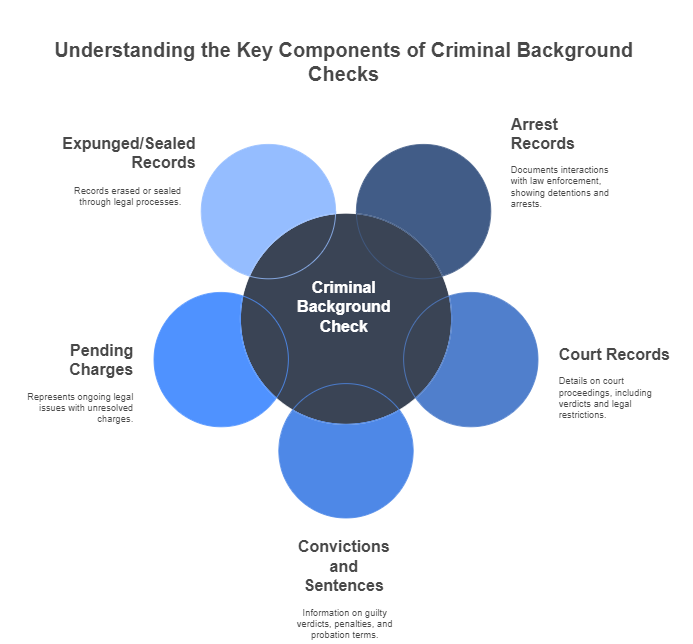
A criminal background check can contain a variety of information, which helps employers, landlords, and licensing agencies assess the background of an individual. The exact information provided depends on the type of background check performed (county, state, federal, or FBI). Let’s break down the most common types of information that can be found in these checks:
- Arrest Records
- Arrest records are typically the first piece of information that appears on a criminal background check. They document any interactions an individual has had with law enforcement where they were detained, questioned, or arrested.
- It’s important to note that an arrest does not necessarily mean guilt; the person may have been acquitted or charges may have been dropped. However, an arrest record will still show up on a background check and may be considered by employers or landlords.
- Court Records
- These records provide information on any court proceedings involving the individual. They include details on criminal cases, the verdict (guilty or not guilty), and any sentencing decisions.
- Court records may also include information on probation, parole, or any other legal restrictions placed on the individual.
- Convictions and Sentences
- A conviction occurs when an individual is found guilty of a crime. Conviction records are among the most crucial pieces of information in a criminal background check.
- Convictions are classified by severity, such as felonies, misdemeanors, or infractions. Convictions will often detail the offense, the penalty or sentence imposed, whether it involved jail time, fines, or other punishments, and any probation terms.
- Convictions are the most significant factor when determining eligibility for employment or housing in most cases.
- Pending Charges
- If a person has charges that are pending (i.e., they’ve been arrested, but the case is still in the legal process), this information will appear in the background check. Pending charges represent ongoing legal issues that could affect decisions regarding employment or housing.
- Pending charges might include serious offenses such as fraud, assault, or drug-related crimes.
- Expunged or Sealed Records
- Expungement is a legal process that allows individuals to have their criminal records erased or sealed, often for minor offenses or after a period of time.
- While these records may not appear on a typical background check, it’s important to note that sealed records may be disclosed in specific circumstances, such as when required by law or during certain types of background checks (e.g., FBI checks).
- Sex Offender Registry
- Many background checks include a search of the National Sex Offender Registry. This registry lists individuals convicted of sex crimes, such as rape, sexual assault, and child exploitation.
- The inclusion of this information can be especially important for employment in fields such as education, healthcare, and other positions involving vulnerable individuals.
How is Criminal Background Check Information Retrieved?
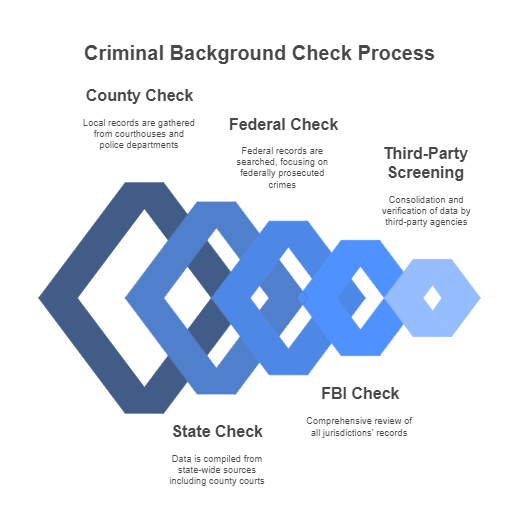
Criminal background checks rely on databases that contain records of criminal activity. These records are sourced from multiple agencies, including local law enforcement, court systems, and federal agencies. The methods of retrieving criminal background information can vary depending on the type of check being conducted:
- County Criminal Background Check:
- This type of check focuses on local jurisdiction records. Information is obtained from county courthouses, police departments, and local databases that maintain criminal records.
- A county check is particularly useful for employers or landlords looking to assess an individual’s local criminal history, as it is specific to where they’ve lived or worked.
- State Criminal Background Check:
- A state-level check gathers data from a state’s various county courts and law enforcement agencies. It can include information on both felony and misdemeanor offenses committed within the state.
- State checks typically pull data from a state’s criminal history repository (often maintained by the state police) and can provide a broader view of an individual’s criminal background across the state.
- Federal Criminal Background Check:
- Federal checks search records from federal law enforcement agencies like the FBI, focusing on crimes that are prosecuted at the federal level. These crimes include white-collar crimes (e.g., fraud, embezzlement), immigration violations, and major drug offenses.
- A federal check can provide insight into offenses that are not found in state or county records.
- FBI Criminal Background Check:
- The FBI check is the most comprehensive background check, looking at records from all jurisdictions, including local (county), state, and federal databases. It is particularly useful for employers or organizations in industries requiring the highest level of security clearance.
- Third-Party Background Screening Agencies:
- Many organizations rely on third-party background screening companies, like Rapid Hire Solutions, to conduct criminal background checks. These companies have access to extensive databases, helping employers ensure they’re meeting legal compliance standards.
- These agencies help ensure the accuracy and thoroughness of checks by consolidating data from various sources, including court records, arrest records, and sex offender registries.
Employment Background Check vs. Other Types of Background Checks
While the information in a criminal background check is generally the same, the purpose of the check often determines what information is emphasized or examined. For example:
- Employment Background Checks: Employers are typically concerned with convictions and the severity of crimes relevant to the job. For example, an employer hiring a driver may focus on DUI convictions, while a healthcare employer might focus on felony convictions related to patient care.
- Housing Background Checks: Landlords often focus on violent crimes or property crimes (e.g., theft, vandalism), as these may directly affect the safety of the property or other tenants. Minor offenses may not be as significant unless they have a pattern of repeat offenses.
- Licensing Background Checks: Certain industries, such as law, healthcare, or real estate, require thorough criminal background checks as part of their licensing process. These checks can examine any history of felony convictions, financial crimes, or fraud.
Table: Common Elements Found in a Criminal Background Check for Employment vs. Other Uses
| Check Type | Common Information Included | Key Focus |
|---|---|---|
| Employment Check | Arrest records, convictions, court records, pending charges | Crimes relevant to job responsibilities, including fraud or violence |
| Housing Check | Arrest records, convictions for violent or property crimes | Safety concerns, tenancy risks, criminal behavior that affects others |
| Licensing Check | Convictions, federal offenses, financial crimes | Crimes related to industry standards and legal compliance |
| FBI Background Check | Complete criminal history from local, state, and federal sources | Comprehensive criminal activity, especially for high-security roles |
| County Background Check | Arrest records, county-level convictions | Local criminal activity, particularly for residents or workers in that area |
Legal Aspects, FAQs, and Conclusion
When discussing what a criminal background check looks like, it’s important to consider the legal aspects that govern how the information is collected, used, and maintained. In this section, we’ll explore the legal guidelines surrounding criminal background checks, such as the Fair Credit Reporting Act (FCRA), the role of the Equal Employment Opportunity Commission (EEOC), and state-specific regulations. Additionally, we’ll address common issues related to criminal background checks, such as errors in records, expungement, and the impact of criminal history on employment. Finally, we will provide answers to some frequently asked questions (FAQs) to help clarify common concerns.
Legal Aspects of Criminal Background Checks
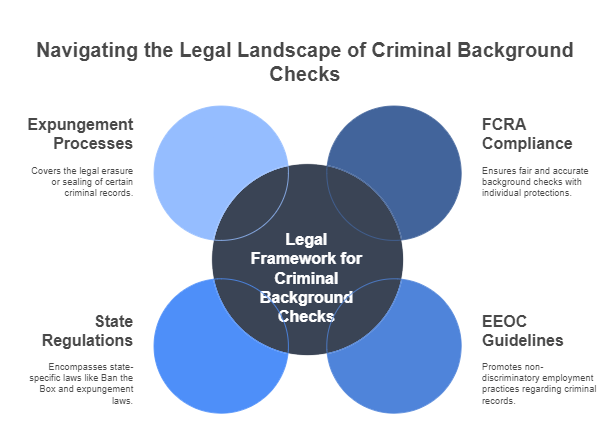
Several key laws regulate how criminal background checks are conducted, the information they can contain, and how that information can be used. Understanding these laws is crucial to ensuring compliance and protecting individuals’ rights.
- Fair Credit Reporting Act (FCRA):
- The FCRA is a federal law that governs the use of consumer information, including criminal background checks. The law aims to ensure that background checks are conducted fairly and accurately, and it provides protections for individuals against inaccurate or misleading information.
- Under the FCRA, background check companies must:
- Obtain written consent from the individual before conducting a check.
- Provide the individual with a copy of the report if the employer intends to take an adverse action (e.g., rejecting a job application) based on the report.
- Correct any errors found in the report if the individual disputes the information.
- Equal Employment Opportunity Commission (EEOC) Guidelines:
- The EEOC enforces federal laws prohibiting discrimination in employment based on race, color, religion, sex, or national origin. Regarding criminal background checks, the EEOC has issued guidelines to ensure that employers use criminal history information fairly and without discrimination.
- Employers must be cautious when considering criminal records, as the EEOC advises against blanket policies that exclude individuals with criminal records from employment opportunities. Instead, employers should evaluate the nature of the offense, the time passed since the conviction, and its relevance to the job.
- The EEOC’s guidelines also emphasize the need for employers to individualize their assessments, meaning each case should be evaluated on its own merits, taking into account the circumstances surrounding the offense.
- State-Specific Regulations:
- In addition to federal laws, many states have their own laws regulating the use of criminal background checks. These laws may vary significantly by state and can include:
- Ban the Box laws: These laws prohibit employers from asking about an applicant’s criminal history on initial job applications, requiring employers to consider qualifications first before criminal history.
- Expungement laws: Many states have laws allowing individuals to expunge or seal certain criminal records, preventing them from appearing on background checks.
- Fair Hiring laws: Some states, like California, require employers to justify their decisions to reject applicants based on criminal records, ensuring that the decision is both relevant and fair.
- In addition to federal laws, many states have their own laws regulating the use of criminal background checks. These laws may vary significantly by state and can include:
- Expungement and Sealing of Criminal Records:
- Expungement refers to the legal process by which certain criminal records are erased or sealed from public view. Expunged records do not typically appear on criminal background checks.
- However, it’s important to note that expunged records can sometimes be accessed in certain circumstances, such as for employment in sensitive positions, government jobs, or positions requiring high security clearance.
- Understanding whether a record is eligible for expungement or sealing depends on state laws, the type of crime, and the individual’s criminal history.
Frequently Asked Questions (FAQs)
Here are some of the most common questions people ask when seeking to understand what does a criminal background check look like:
What does a criminal background check include?
A criminal background check typically includes information on arrest records, court records, convictions, sentences, pending charges, and possibly expunged or sealed records. The specific information depends on the type of background check (county, state, federal).
How far back does a criminal background check go?
The length of time a criminal background check covers depends on the jurisdiction and the type of check. For example:
-
- County and state checks may go back several years or decades, depending on local laws.
- Federal background checks look at records across the entire country, including federal crimes, and often do not have a time limit for how far back they go.
- The FCRA generally limits how far back background checks can go for employment purposes, often capping records at 7 years, unless the job involves a high-level position or salary.
Can I be denied employment based on my criminal record?
Yes, an employer can deny employment based on a criminal record, but they must comply with legal requirements. The EEOC and FCRA guidelines stipulate that employers must assess the nature of the offense and whether it is relevant to the job position. In addition, they must give the individual an opportunity to explain the record before making a final decision.
What should I do if I find an error on my criminal background check?
If you find an error on your criminal background check, you have the right to dispute it. Under the FCRA, the reporting agency must investigate and correct any inaccuracies. Contact the agency that conducted the background check and provide documentation or evidence to support your claim.
How does a criminal background check differ for employment versus housing?
For employment, the focus is typically on convictions that are directly relevant to the job, particularly in cases of fraud, violence, or theft. For housing, landlords are more likely to look at violent crimes and property crimes, which could affect the safety and security of the property and tenants. Housing checks are generally more concerned with rental history and whether an individual is a potential risk to the community.
Conclusion
Understanding what does a criminal background check look like is essential for both individuals and organizations involved in employment, housing, or licensing decisions. Criminal background checks can provide critical information on an individual’s criminal history, including arrest records, court cases, convictions, and pending charges. By understanding the various elements of a criminal background check and the legal aspects governing their use, individuals can better navigate the background check process.
Employers and organizations must comply with laws such as the FCRA and EEOC guidelines to ensure they use criminal background information fairly and accurately. It is also important to remember that state-specific regulations and expungement laws may impact how criminal records are accessed and used.
As we’ve seen, a criminal background check can vary depending on its purpose and the jurisdiction, but understanding what’s included can help individuals and employers make informed decisions. Whether you’re an applicant undergoing a background check or an employer conducting one, ensuring that the process is legally compliant and transparent is key to maintaining fairness and accuracy.
